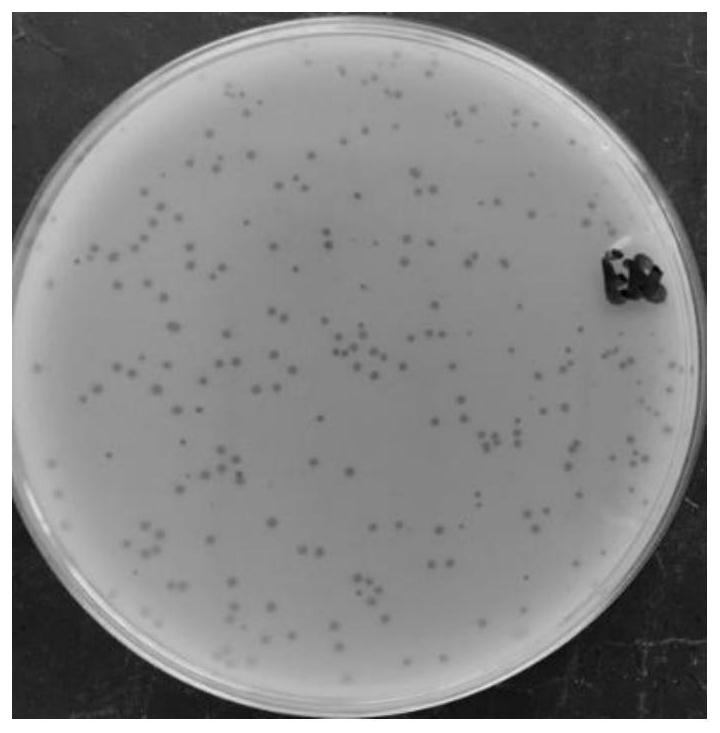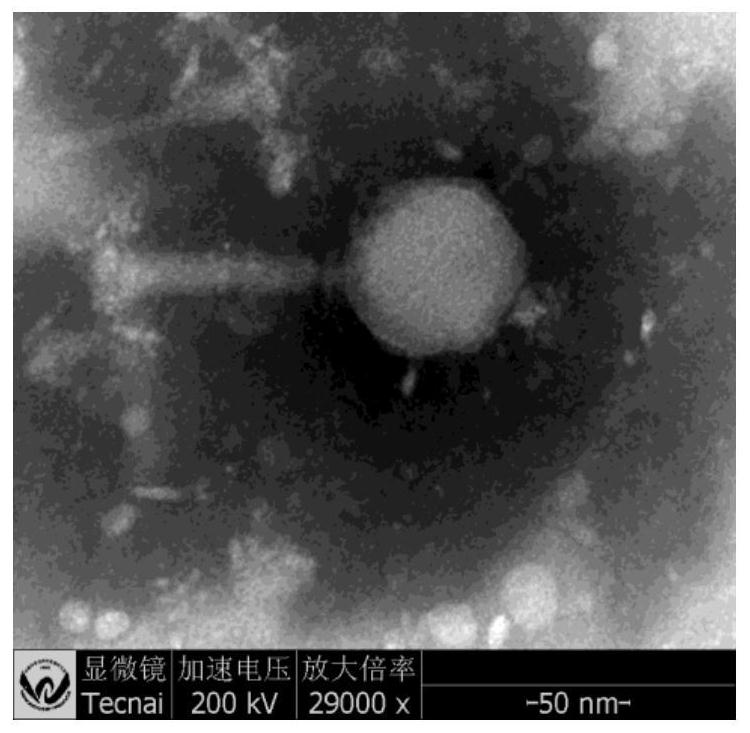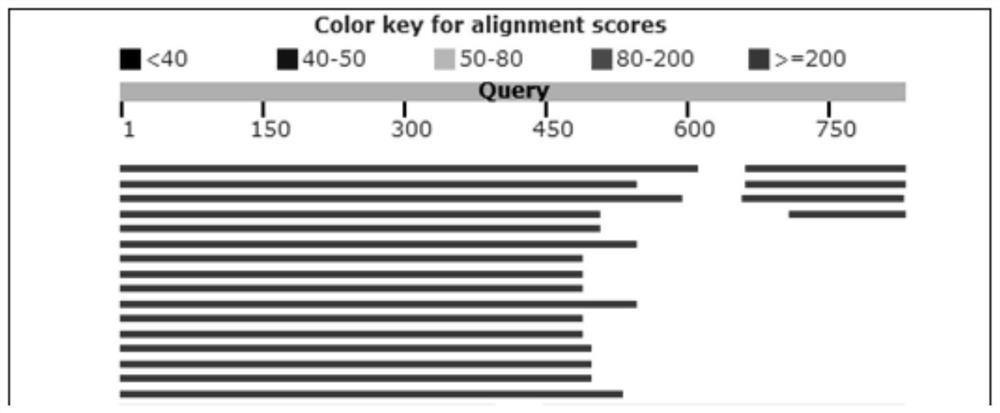A Salmonella enteritidis phage lpse28 and its application in food
A technology of Salmonella enteritidis and Salmonella, applied in Salmonella enteritidis phage LPSE28, liquid eggs, application of Salmonella enteritidis phage LPSE28 in food and milk system, can solve the problem of misjudgment of phage and achieve good cracking effect and good antibacterial effect , good stability effect
- Summary
- Abstract
- Description
- Claims
- Application Information
AI Technical Summary
Problems solved by technology
Method used
Image
Examples
Embodiment 1
[0043]A method for the isolation and screening of Salmonella enteritidis phage LPSE28, the steps are:
[0044](1) Sample collection
[0045]The sewage sample came from the Jiufengshan Chicken Farm in Wuhan City, Hubei Province.
[0046](2) Screening of Salmonella phage
[0047]Take 10 mL of sewage sample and filter with 0.22μm microporous filter. Put 20mL sterilized TSB medium (tryptone soy broth medium, the composition of the medium is: tryptone 17.0g / L, soy peptone 3.0g / L, sodium chloride 5.0g / L, Dipotassium hydrogen phosphate 2.5g / L, glucose 2.5g / L, pH value 7.3±0.2; the method of use of this medium is: weigh 30.0g of TSB medium with the above ingredients, heat and stir to dissolve in 1000mL distilled water, and aliquot In a test tube or other suitable container, autoclave at 121°C for 20 minutes in a 50 mL sterile centrifuge tube, and add 5 mL of sensitive indicator bacteria in the logarithmic growth phase (cultivation for 6-8 hours). Shake culture at 37°C for 12-18h to proliferate the phag...
Embodiment 2
[0060]Example 2: Determination of the host profile of phage LPSE28
[0061]The test selected 8 standard Salmonella strains (Salmonella enteritidis ATCC13076, SJTUF10978, SJTUF10984, SGSC4901; Salmonella typhimurium ATCC14028, ATCC13311; Salmonella pullorum CVCC534; Salmonella paratyphi B CMCC50094 and 30 other species of Salmonella enteritidis (LK5-3820; Salmonella enteritidis) Salmonella typhimurium CT18, Ty2, ST-8, UK-1,490,1344; Salmonella pullorum C79-3; Escherichia coli D41, H10417, K12, DH5α and Salmonella enteritidis resistant strains 1490, 2194, 2195, 2324, 2211 , 2247, 2302, 2428; Salmonella typhimurium resistant strains 893, 1893, 2069, 2088, 2238, 2395, 2459, 2511; Oranienburg Salmonella resistant strain 4835; Corvallis Salmonella resistant strain 2031) To analyze the host profile of phage LPSE28, the specific steps are as follows:
[0062]The above-mentioned strains (8 standard Salmonella strains and 30 other species strains) were cultivated to the logarithmic phase. Take 100μ...
Embodiment 3
[0068]Example 3: Electron microscopic observation of phage LPSE28
[0069]Phage LPSE28 stock solution (The preparation method of bacteriophage LPSE28 stock solution is: inoculate Salmonella enteritidis ATCC13076 in a 3mL liquid TSB bacterial bottle, incubate at 37℃ for about 6 hours, take 100μL of the above bacterial solution in 10mL fresh TSB, and then add 100μL of phage LPSE28 stored at 4℃ After mixing, incubate in a shaking incubator at 37°C for 12-18h to proliferate the phage. Take 5mL of proliferation solution in a centrifuge tube, centrifuge at 1000g for 10min to remove bacterial debris, and filter the supernatant with a 0.22μm filter membrane to obtain the phage stock solution) by 50000× g. After ultracentrifugation at 4°C, resuspend in 1 mL of 0.1M ammonium acetate buffer and ice bath to obtain samples. Take 20 μL samples (1010-1011pfu / mL) and 20 uL of 2% phosphotungstic acid (PTA) with a volume fraction of 2% and pH 7.0 were dropped onto the parafilm. Take the copper mesh gent...
PUM
 Login to View More
Login to View More Abstract
Description
Claims
Application Information
 Login to View More
Login to View More - R&D
- Intellectual Property
- Life Sciences
- Materials
- Tech Scout
- Unparalleled Data Quality
- Higher Quality Content
- 60% Fewer Hallucinations
Browse by: Latest US Patents, China's latest patents, Technical Efficacy Thesaurus, Application Domain, Technology Topic, Popular Technical Reports.
© 2025 PatSnap. All rights reserved.Legal|Privacy policy|Modern Slavery Act Transparency Statement|Sitemap|About US| Contact US: help@patsnap.com



